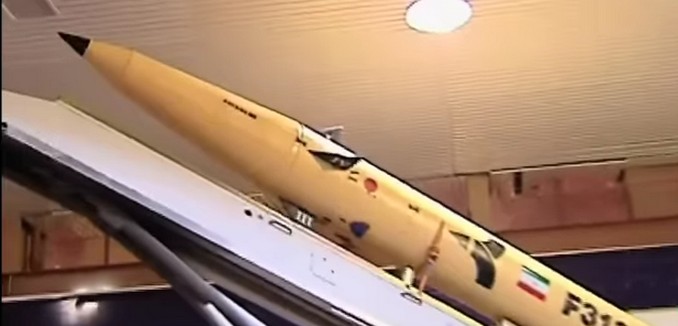Iran’s President Hassan Rouhani hailed the unveiling of a new ballistic missile, saying that Iran “will not ask for permission or abide by any resolution” to procure any weapons it needs, Reuters reported Saturday. Rouhani’s declaration challenges the terms of United Nations Security Council Resolution 2231, which endorsed the Joint Comprehensive Plan of Action (JCPOA) and required Iran to observe restrictions on its ballistic missile program.
The defense ministry’s unveiling of the solid-fuel missile, named Fateh 313, came little more than a month after Iran and world powers reached a deal that requires Tehran to abide by new limits on its nuclear program in return for Western governments easing economic sanctions.
According to that deal, any transfer to Iran of ballistic missile technology during the next eight years will be subject to the approval of the United Nations Security Council, and the United States has promised to veto any such requests. An arms embargo on conventional weapons also stays, preventing their import and export for five years.
The Fateh 313 is a short-range ballistic missile that can strike targets within 500 kilometers (310 miles).
At a ceremony introducing the new weapon, Rouhani said, “We will buy, sell and develop any weapons we need and we will not ask for permission or abide by any resolution for that.”
United Nations Security Council Resolution 2231 (.pdf) calls upon Iran “not to undertake any activity related to ballistic missiles designed to be capable of delivering nuclear weapons, including launches using such ballistic missile technology.” In her explanation of the resolution, United States Ambassador to the United Nations Samantha Power said that it will “require Iran and all states to comply with legally binding restrictions on nuclear-, conventional arms-, and ballistic missile-related activities.”
Behnam Ben Taleblu, an Iran research analyst at the Foundation for Defense of Democracies, observed last week in The National Interest that Iran’s short range ballistic missiles, like the Fateh 313, can carry unconventional payloads.
However, Iran had previously insisted that “it has not accepted or endorsed the annex, adding that none of its ballistic missiles has been designed to carry nuclear payloads, and thus, its ballistic missile program is no way related to the paragraph.”
Reuters reported that an Islamic Revolutionary Guard Corps (IRGC) commander reiterated a previous commitment to hold ballistic missile tests in the near future. Brigadier General Amirali Hajizadeh said, “Some wrongly think Iran has suspended its ballistic missile programs in the last two years and has made a deal on its missile program … We will have a new ballistic missile test in the near future that will be a thorn in the eyes of our enemies.” Earlier this month, another IRGC commander, Brigadier General Ahmad Reza Pourdastan, said that Iran would hold “specialized missile drilling.”
[Photo: AFP news agency / YouTube ]




